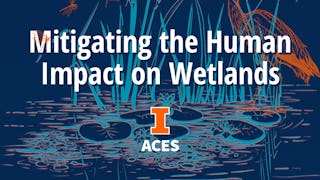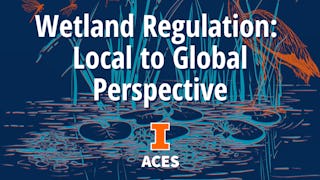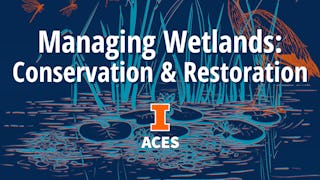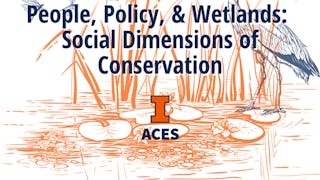Wetland conservation is not just an ecological challenge—it is also deeply shaped by social, political, and cultural factors. This course explores how competing stakeholder interests, policy frameworks, and governance structures influence wetland management and restoration. Learners will examine the role of public, private, and social sectors in conservation efforts, as well as strategies for fostering equitable and culturally sensitive stakeholder engagement. Through case studies, the course highlights both successful collaborations and the consequences of stakeholder exclusion in environmental decision-making. By the end, learners will gain a comprehensive understanding of how human dynamics shape wetland conservation outcomes.
Unlock access to 10,000+ courses with Coursera Plus. Start 7-Day free trial.


您将学到什么
Analyze the social, political, & cultural factors that influence wetland conservation, including the roles of stakeholders, policy, & governance.
Evaluate strategies for equitable and culturally sensitive stakeholder engagement in wetland management.
您将获得的技能
- Diversity Equity and Inclusion Initiatives
- Conflict Management
- Case Studies
- Cultural Diversity
- Community Outreach
- Policy Analysis
- Environmental Issue
- Water Resources
- Driving engagement
- Social Sciences
- Natural Resource Management
- Cultural Sensitivity
- Stakeholder Engagement
- Critical Thinking
- Governance
- Environment and Resource Management
要了解的详细信息

添加到您的领英档案
6 项作业
了解顶级公司的员工如何掌握热门技能

积累特定领域的专业知识
- 向行业专家学习新概念
- 获得对主题或工具的基础理解
- 通过实践项目培养工作相关技能
- 获得可共享的职业证书

该课程共有4个模块
You will become familiar with the course, your classmates, and our learning environment. The orientation will also help you obtain the technical skills required for the course. Wetlands provide vital ecosystem services that support biodiversity, water quality, and climate regulation, making their conservation and management critical. This module explores the concept of ecosystem services, focusing on their significance in wetland conservation efforts. You will also examine the diverse stakeholders involved, how their priorities shape decision-making, and the trade-offs that arise when competing interests lead to conflicts over wetland use. Through this exploration, you will gain a deeper understanding of the complexities of balancing conservation and resource demands.
涵盖的内容
14个视频6篇阅读材料2个作业1个讨论话题
This module explores the roles of the public, private, and social sectors in shaping wetland conservation and policy. You will compare how each sector influences decision-making and assess the benefits of cross-sector collaboration in achieving conservation goals. The module also introduces key tools for social and political analysis, providing insight into how they can be applied to wetland management and policy development. By the end, you will have a deeper understanding of the interconnected forces driving wetland conservation efforts.
涵盖的内容
11个视频2篇阅读材料1个作业
This module examines the role of stakeholder engagement in environmental decision-making, with a focus on wetland conservation. You will explore the structural, economic, social, and political barriers that can limit participation in conservation efforts. The module also introduces strategies for fostering respectful, equitable, and meaningful engagement with culturally diverse communities. By the end, you will understand the importance of inclusive decision-making and how to navigate challenges in stakeholder collaboration.
涵盖的内容
9个视频3篇阅读材料1个作业
Effective stakeholder engagement is essential for sustainable environmental decision-making and governance. In this module, you will examine real-world examples of successful stakeholder engagement across diverse contexts, identifying key factors that contribute to positive outcomes. Through case studies and critical analysis, you will also explore the consequences of stakeholder exclusion and its broader implications for policy and resource management. By the end of the module, you will develop a deeper understanding of inclusive decision-making strategies and their role in addressing complex environmental challenges.
涵盖的内容
7个视频5篇阅读材料2个作业
获得职业证书
将此证书添加到您的 LinkedIn 个人资料、简历或履历中。在社交媒体和绩效考核中分享。
位教师

从 Environmental Science and Sustainability 浏览更多内容
 状态:免费试用
状态:免费试用University of Illinois Urbana-Champaign
 状态:免费试用
状态:免费试用University of Illinois Urbana-Champaign
 状态:免费试用
状态:免费试用University of Illinois Urbana-Champaign
 状态:免费试用
状态:免费试用University of Illinois Urbana-Champaign
人们为什么选择 Coursera 来帮助自己实现职业发展




常见问题
Yes! Although completion of the Coursera course alone is not credit-bearing, it is a required component of a graduate-level Canvas course that can be "stacked" toward advanced credentials such as an academic (transcriptable) graduate certificate or a degree. If you decide to pursue further education, the credits you earn from this course can be applied toward a formal academic program, provided that you meet all the requirements of admission to the certificate or degree. Learn more about the Wetland Science and Conservation Graduate Certificate.
To access the course materials, assignments and to earn a Certificate, you will need to purchase the Certificate experience when you enroll in a course. You can try a Free Trial instead, or apply for Financial Aid. The course may offer 'Full Course, No Certificate' instead. This option lets you see all course materials, submit required assessments, and get a final grade. This also means that you will not be able to purchase a Certificate experience.
When you enroll in the course, you get access to all of the courses in the Specialization, and you earn a certificate when you complete the work. Your electronic Certificate will be added to your Accomplishments page - from there, you can print your Certificate or add it to your LinkedIn profile.
更多问题
提供助学金,



